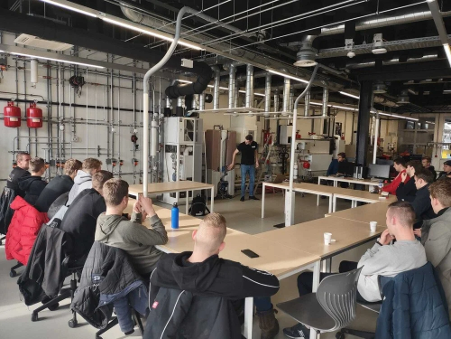5 minute read
The benefits of greywater recycling

Drinking water is an essential part of our lives. Especially in times of climate change and increasing drinking water scarcity, it is essential to find sustainable solutions to secure drinking water supplies. Greywater recycling and rainwater are two popular methods to save drinking water by using a second type of water for non-potable applications.
In this short white paper, we discuss the advantages of water recycling with Hydraloop over rainwater systems. Among other things, we cover purchase and installation costs and the limitations of rainwater systems during dry periods.
What is water recycling?
Greywater is lightly contaminated water from showers, sinks and washing machines. Hydraloop collects this water. Using environmentally friendly techniques, the water is cleaned and disinfected. You can then use the water a second time for applications that do not require drinking water quality: for example, toilet flushing, washing machines and garden irrigation.
Advantages of water recycling with Hydraloop
-
Lower purchase and installation costs
Water recycling systems such as Hydraloop typically have lower purchase and installation costs than rainwater systems. Rainwater systems often require larger installations and infrastructure modifications, while Hydraloop systems are compact and easy to install.
-
Reliability in dry periods
Rainwater systems rely on precipitation and often run dry during the summer months. Hydraloop, on the other hand, recycles domestic water that is available all year round, regardless of the weather. This provides a constant and reliable source of recycled circular water.
-
Efficient Water Use
Hydraloop systems allow you to optimise your drinking water use. This is possible because they continuously recycle water for reuse in domestic and garden applications. This leads to a significant reduction in your drinking water consumption: environmentally friendly and cost-efficient.
-
Wastewater reduction
By collecting, cleaning and using water twice, it does not immediately flow through the sewer system to wastewater treatment. This reduces wastewater emissions and wastewater treatment requirements. This saves energy and treatment costs in countries where wastewater costs are included in drinking water tariffs.
-
Environmentally friendly
By recycling water, you reduce your carbon footprint. Less water consumption means less pressure on water resources and less wastewater to be treated. This contributes to a more sustainable future.
-
Saving energy
During the colder months of the year, water recycling saves energy in three ways. For a family of four, this can nominally be 600 kWh per year.
- No drinking water is brought in from outside the house for toilet flushing. Drinking water has a temperature of max 8 degrees in winter. The cold water has a temperature lowering effect in the house and the central heating system has to compensate for this cooling effect by heating slightly more.
- The washing machine does not import cold drinking water but pre-heated Hydraloop water, so the heating element uses less electricity to heat the water to the set temperature.
- If the Hydraloop system is in the house, the residual heat from the shower water will radiate this residual heat into the house. As a result, the central heating system will use a little less energy.
-
Self-sufficiency
Hydraloop makes your home more self-sufficient. In times of water scarcity, you have a reliable source of recycled water for essential tasks like toilet flushing and garden irrigation, without depending on external water sources. When water companies call for shorter showers, this is unnecessary if a Hydraloop is installed in the home, as the shower water is used a second time for toilet flushing. Shorter showers actually produce less recycled water, resulting in toilets then being flushed with scarce drinking water. The Hydraloop app helps strike the right balance between living comfort and drinking water conservation.
-
Steigern Sie den Wert Ihres Hauses
A home equipped with a Hydraloop system is more attractive to environmentally conscious buyers and can increase the value of your home. Drinking water will become scarcer and more expensive in the coming years. Water-sustainable homes will have a higher value in the future, and investing in grey water recycling will pay off in a future sale.
-
Innovation and comfort
Hydraloop offers a high level of automation and requires minimal maintenance. The system works efficiently, and you hardly notice its presence. The Hydraloop smartphone app allows you to monitor and optimise your water savings.
Disadvantages of Rainwater systems
Dependence on precipitation
Rainwater systems depend on sufficient precipitation to stay filled. During dry periods, the tanks are often empty and refilled with potable water. This means you remain dependent on the drinking water network and therefore do not save drinking water.
Higher initial costs
The purchase and installation of rainwater systems are usually more expensive due to the infrastructure and excavation work required to dig in the tanks.
Conclusion
Water recycling with Hydraloop offers advantages over rainwater systems, especially in terms of cost, reliability and environmental friendliness and the availability of circular water. By choosing Hydraloop, you can save water and energy, reduce your carbon footprint and contribute to a sustainable future, while enjoying comfort and self-sufficiency.





